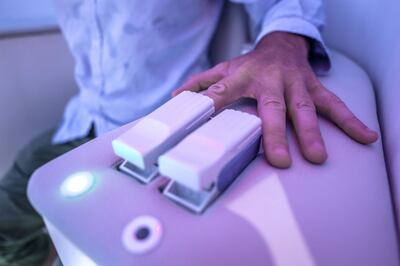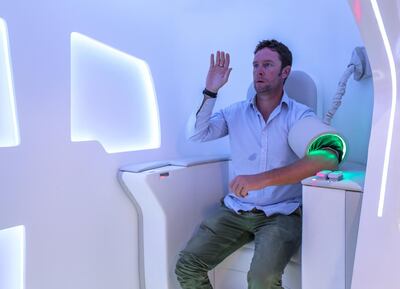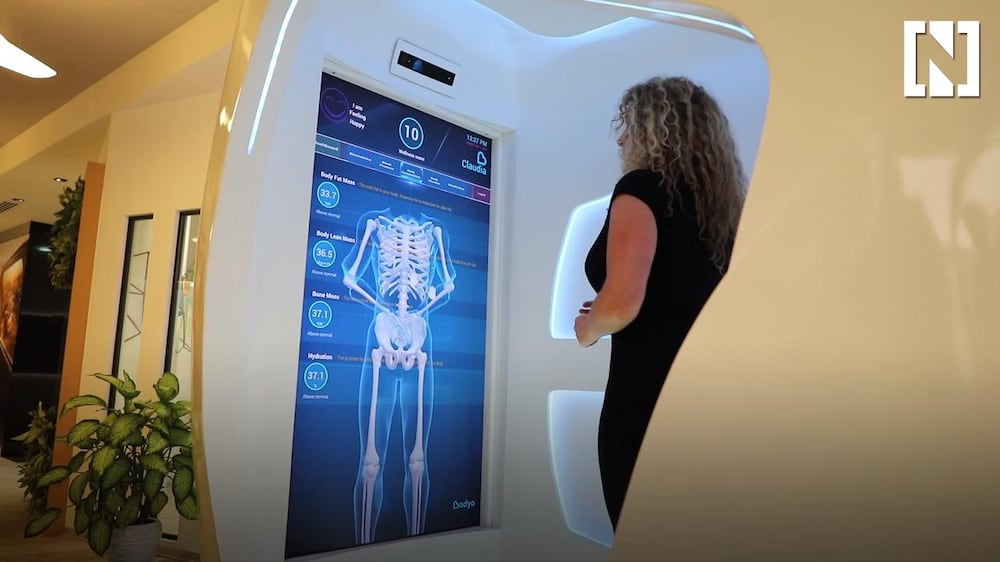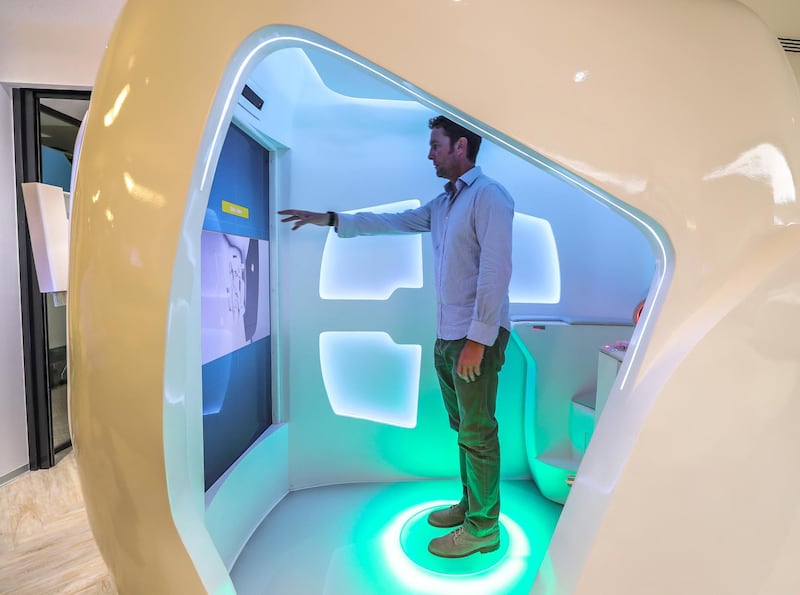Full body scanners to help diagnose health problems at an early stage are the subject of a new trial that could result in the technology being rolled out into everyday life.
Tech firm Bodyo’s health analysis pods have been selected by the Dubai Future Foundation for the Future Accelerator programme, an intensive nine-week project pairing the world’s most exciting engineering companies with leading government organisations.
The company is one of just four out of 677 applicants selected by Dubai Health Authority to create solutions for problems facing society.
Although not yet clear if or how many of the AiPods will be taken up by the DHA, it is a technology the authority is taking a serious look at to manage population health.
If successful, the AiPod health kiosk could become a common sight in shopping malls, gyms, hospitals and clinics around Dubai in the near future.
“We have developed products that enable us to detect and monitor community and population health data using our own algorithm and Artificial Intelligence,” said Bodyo General Trading founder Patrice Coutard, a sports scientist and head performance coach of the UAE national football team.
“This enables us to monitor happiness, health, fitness and early detection of serious health conditions such as chronic heart disease and early detection of diabetes.”
The pods could reduce the need for people feeling unwell to visit their GP or pharmacy.
By visiting their nearest shopping centre or government building, a quick seven-minute AiPod scan detects a host of biomarkers to indicate wellness, or the onset of illness.
______________
Read more:
3-D printing revolutionising the medical industry, say experts
Artificial Intelligence helping diabetic patients keep their sight
Healthcare industry report warns UAE needs better cancer facilities - and far more nurses
_______________
Health data from pre-registered patients is then passed on to doctors, who can make further recommendations or arrange a consultation.
“We want to change the mindset of doctors and patients, in which this technology is non-invasive and it is a self-service interaction, without feeling like a medical process – to encourage people to want to return to improve their own health,” said Tariq Hussain, Bodyo’s chief executive.
“There is an initial set-up process that can be time-consuming as it’s new. After that, once people are familiar with the pods, they will become very recognisable and user-friendly.”
Investment bank Alpen Capital recently warned of a shortage of nurses in a growing healthcare market, with Bodyo’s developers claiming the AiPods could help to fill the void.
About five nurses would need to extract the kind of health data produced from a short Bodyo scan, with a single nurse required to operate one of the pods.
The technology promises to bring down overall healthcare costs, and empower individuals to take responsibility for their own health by giving access to their personal biometrics.
Companies could even offer employees financial incentives to improve their health, with regular monitoring of their progress to reduce the spiralling costs of future care of long-term chronic diseases like diabetes and heart disease.

“We envisage CEOs asking employees to encourage staff to have a Bodyo check once a month so they can then go to insurers to prove how healthy they are and manage their insurance costs accordingly,” said Mr Hussain.
“That model would then encourage an incentive programme to stay healthy.
“Dubai is a city of firsts, if they can incentivise people financially to look after their own health, that could be a massive statement in the way healthcare is managed in future.”
To rent out the pods, health authorities can expect to pay $1,000 to $1,400 (Dh3,650 to Dh5,100) a month per pod, depending on the rental term.
Data is uploaded to a secure cloud and never shared with a third party without a user’s consent.
Bodyo has developed a set of Home Health Monitoring devices, capturing health vitals shared through IOS and Android apps, or a supervisor dashboard to provide individual health and lifestyle programmes.
The latest 360 Wellbeing Survey by Cigna Insurance Middle East found 50 per cent of respondents are concerned about their ability to meet future healthcare needs for themselves and their families.
“In a faster, more connected world, having access to care that is customised to the needs of the individual can make a world of difference in ensuring better health outcomes,” said Art Cozad, Cigna's Middle East CEO.
“We must consider the economics of health itself.
“Apps that can deliver a well-being-focused approach to health management can lead to a healthier population, which means the burden of health costs is reduced in the long run.
“This directly ties back to the need for managing the risk of a health condition before it occurs, which can be possible through an ever-present app.”
__________________
“My blood sugars were good, but my blood pressure was slightly off" - inside the health scanner that could save lives
Stepping into a Bodyo health pod is like getting to grips with a new mobile phone – the experience feels clunky yet familiar, and the potential is clear.
Slotting your Emirates ID into the machine to register a Bodyo account feels like handing over control of your personal health data – unnerving in the current climate of social media giants swapping private information for profit.
Developers insist data collected is secure, and cannot be offered to third parties without consent.
Similar to an old-fashioned photo booth or arcade machine, you enter the pod and type in your log in credentials before the health scan begins.
Standing on a centre spot that monitors your weight and a variety of other biometric indicators, hand movements activate an on screen cursor to access a menu of options. Motion sensors are soon to be replaced by voice activation software to speed up the process.
The pod then offers a mirror image on screen, instructing the user to sit down and insert forefinger and index finger into pulse monitors that also pick up other vital signs, while a second detector clamps on to an ankle on the opposite side.

Further information is gleaned and once complete, it’s then time for a blood pressure reading.
A suspended cuff on the left can be positioned in place to then inflate around your upper arm for another reading.
A few seconds later and Bodyo instructs you to return to a standing position to await the results.
In just minutes, the diagnosis is complete. The motion sensor picks up your hand movements, allowing you to swipe right to left in mid-air to access pages of results.
_______________
Read more:
Space age medical technology on show at Arab Health Conference
Surgeons to get better feel for remote operations when 5G technology rolls out
________________
Data includes blood pressure, blood sugar, weight, height, muscle mass, fat mass, bone quality, hydration and water retention and predicted daily calorie needs.
While individual data can help doctors evaluate a broader picture of overall health, a combined wellness score can encourage individuals to manage lifestyle to prevent chronic health conditions and achieve personal fitness goals.
The National's multimedia journalist Andy Scott, a diabetic who monitors his blood sugar levels twice a day, was one of the first to step into the pod. Watch his report below:
Is this the future of healthcare?

“I’ve been diabetic for 13 years, so I’m aware of what I need to do to monitor my own health,” he said.
“I can see how the Bodyo could help people understand their diabetes and its effect on those recently diagnosed, and how it can help prevent the condition by monitoring related physical indicators.
“My blood sugars were good, but my blood pressure was slightly off – there was nothing that stood out that I would not expect to see.
“It is very thorough with the amount of numbers and data it was producing.
“I wasn’t entirely sure what they all meant, but I’m sure they would be very useful for a doctor.”







